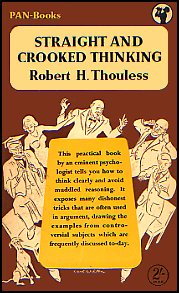
Robert Thouless’ little book, Straight and Crooked Thinking, has been considered a classic guide to ferreting out untruths, half-truths, and other distortions of facts in political and social discussions since it was first published in 1932. It’s been reissued at least a half-dozen times since, most recently in 1990 by Hodder Arnold. But from then until April 2011, it was out of print and copies on Amazon started at $27.00–for what was at most a $2 paperback.
Although there are many other texts on applying logic to argument, Straight and Crooked Thinking remains one of the most succinct and practically-applicable books ever written. One blogger named it as his favorite book of all time, describing it as “a concise work of supreme genius.”
One of the strengths of Thouless’ discussion of various argumentative fallacies is his recognition of the significant role that emotions play in our responses to them. As a psychologist, he doesn’t believe that logic alone is likely ever to win an argument or even budge a skeptical listener. Here, for example, is a short passage from the opening chapter on the use of emotionally-charged words:
Psychology is still a young science and the clearing away from it of emotional words has not gone very far. ‘Passion’, ’emotion’, ‘sex’ are all terms which carry strong emotional meanings, so that it is difficult to discuss a controversial matter in psychology without using words which rouse strong emotions and confuse all issues. Yet there is a psychology of the laboratories which is scientific and tries to use its terms as factually and unemotionally as they are used in any other science, A prominent educational psychologist has said: “When I say that a child is intelligent, I am describing him and not praising him.” In other words, he is using the term ‘ intelligence’ in a factual and emotionally neutral way.
The difficulty of this use is that he cannot be sure that his hearer will also understand it in that way. So emotional neutrality can often be obtained more easily if we stop using the terms of ordinary speech which have accumulated emotional meanings and replace them by new terms which we have invented ourselves and can define as we like. Thus Spearman made it more easy to think about intelligence without being confused by emotional irrelevancies, when he used instead the term ‘general intellectual factor’, which is a term with much the same factual meaning but more precisely defined and carrying no emotional meaning. Some day a psychological genius will give us X or Z to replace the old emotional conception of sex, and we shall be able to discuss psycho-analysis as objectively as a mathematical physicist can discuss the quantum theory.
On a hunch, I did some rooting around in the back stacks of the Internet–otherwise known as the world of peer-to-peer file sharing–and amazingly enough, located an electronic copy of the book scanned in from the 1952 Pan Books (UK) paperback edition whose cover is shown to the right. It was a little ragged, as such things often are, but essentially intact.
So I took the liberty to clean up the formatting and put it into a more presentable layout for printing or e-reading and am making it available for anyone interested. My U. K. readers might find a quick scan useful in preparation for cutting through the campaign rhetoric ahead of the May 6 General Election:
Straight and Crooked Thinking (PDF file)
Out of respect for Mr. Thouless’ legatees, I will be happy to pull this file as soon as a new edition becomes available… Which it has, thanks to Hodder Education: < a href:"http://www.hoddereducation.co.uk/Title/9781444117189/Straight_and_Crooked_Thinking.htm.">http://www.hoddereducation.co.uk/Title/9781444117189/Straight_and_Crooked_Thinking.htm.
